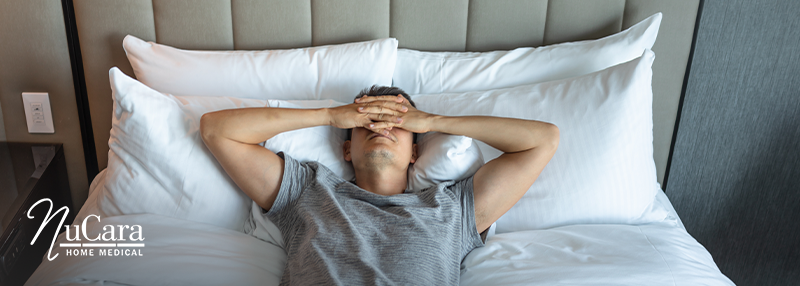NuCara Home Medical
Updated Wed November 26, 2025
Published Under: Sleep Apnea

May is Mental Health Awareness Month, and it’s a great time to talk about something that often gets overlooked—the connection between sleep and mental health, especially when it comes to sleep apnea.
If you’ve been feeling extra tired, anxious, or low lately—and you also deal with sleep apnea—you’re not alone. There’s a growing body of research showing that untreated or poorly managed sleep apnea can take a serious toll on your emotional and mental well-being.
At NuCara Home Medical, we believe in supporting the whole person—not just delivering CPAP supplies. That means helping you better understand your condition and how it may be affecting other parts of your life, including your mood, focus, and energy levels.
How Sleep Apnea and Mental Health Are Connected
Sleep is essential for mental health. During deep, restful sleep, your brain processes emotions, restores cognitive function, and regulates the hormones that help you feel balanced. But with sleep apnea, that deep sleep is constantly interrupted.
Here’s how the connection works:
- Sleep apnea causes breathing interruptions that wake your body up repeatedly during the night—even if you don’t remember it happening.
- Those sleep disruptions prevent you from reaching restorative sleep stages, like REM and deep sleep.
- As a result, your brain doesn’t get the rest it needs, which can lead to symptoms like brain fog, irritability, and even depression or anxiety over time.
Signs Your Sleep Apnea Might Be Affecting Your Mental Health
Not sure if your sleep apnea is playing a role in how you’re feeling emotionally or mentally? Here are some common symptoms people experience:
- Feeling tired all day, even after what seemed like a full night’s sleep
- Struggling to focus or remember things
- Mood swings or feeling more irritable than usual
- Persistent feelings of sadness or hopelessness
- Anxiety, nervousness, or racing thoughts
- Difficulty handling daily stressors
- Loss of interest in activities you used to enjoy
The Good News: Treating Sleep Apnea Can Improve Your Mental Health
There’s hope—and it often starts with getting quality sleep again. Research has shown that people with sleep apnea who start and stick with CPAP therapy often experience:
- Improved mood and reduced depressive symptoms
- Better focus and mental clarity
- Less daytime fatigue and irritability
- More energy and motivation
- A stronger ability to cope with stress
The key is making sure your CPAP therapy is working for you.
Strategies for Supporting Your Mental Health While Living With Sleep Apnea
Managing sleep apnea and mental health together can feel overwhelming—but small changes can make a big difference. Here are some strategies to help:
1. Stick with your CPAP therapy
This might be the most important step. Even when it’s tough or uncomfortable at first, consistency is key to getting the benefits of treatment.
NuCara Tip: If your mask doesn’t fit right, if your machine is bothering you, or if you’re falling off track—we’re here to help. We can walk you through equipment options, troubleshoot issues, or help you get resupplied.
2. Move your body, even a little
Physical activity, even just a short walk, can boost your mood, improve sleep, and help reduce anxiety. Find something you enjoy, and try to get moving each day.
3. Talk to a mental health professional
You don’t have to carry the emotional weight of sleep apnea (or life in general) alone. Therapists, counselors, or support groups can offer valuable tools and support.
4. Practice mindfulness or relaxation techniques
Simple habits like deep breathing, journaling, or a short meditation before bed can calm your nervous system and help you unwind after a stressful day.
5. Create a calming bedtime routine
Set yourself up for better sleep by:
- Turning off screens at least 30 minutes before bed
- Keeping your bedroom cool, dark, and quiet
- Going to bed and waking up at the same time each day
- Showering before bed to relax and remove allergens
6. Ask for help when you need it
Managing a chronic condition like sleep apnea can be mentally and emotionally taxing. You don’t have to do it alone. Whether it’s from a loved one, a counselor, or your sleep care provider—support is always available.
NuCara’s team is here to support your whole journey—not just your supplies. We’ll answer your questions, help you stay on track, and make sure your therapy fits into your life, not the other way around.
How NuCara Home Medical Supports Your Total Well-Being
We understand that managing sleep apnea is about more than just using a machine—it’s about feeling better and living fully. That’s why we provide:
- A full range of CPAP machines, masks, and accessories
- Easy-to-manage resupply programs so you never run out
- Support from real people who care and want to help you succeed
- Help with equipment comfort, insurance questions, and troubleshooting
Final Thoughts: Sleep and Mental Health Go Hand in Hand
If you’re feeling more anxious, down, or tired lately—it could be connected to your sleep apnea. But the good news is, you’re not stuck.
With the right support, consistent treatment, and a little self-care, you can improve both your sleep and your mental health.
And if you ever feel like your CPAP therapy isn’t working or you’re unsure where to turn—reach out to NuCara. We’ll help you breathe easier, sleep better, and feel more like yourself again.
Comments